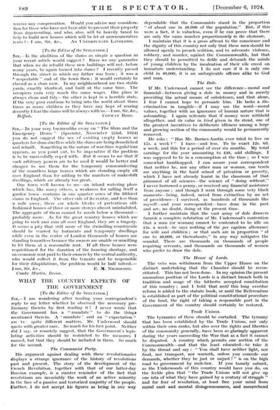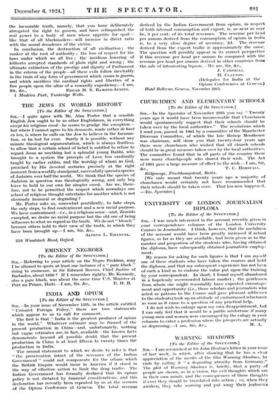WHAT THE COUNTRY EXPECTS OF THE GOVERNMENT
[To the Editor of the SPECTATOR.] SIR, —I am wondering after reading your correspondent's reply to my letter whether he observed the necessary pre- liminary thereto by first reading it ! I never wrote that the Government has a " mandate " to do the things mentioned therein. A ' mandate ' and an " expectation " are to • quite different matters. Mr. Underwood should quote with greater care. So much for his first point. Neither did I say, or remotely suggest, that the Government's legis- lating activities should be restricted to the measures I named, but that they should be included in them. So much for the second.
The Communist Party.
His argument against dealing with these revolutionaries displays a strange ignorance of the history of revolutions past and present. The story of the development of the French Revolution, together with that of our latter-day Russian example, is a sinister reminder of the fact that revolutions are invariably the work of an active minority in the face of a passive and terrorized majority of the people. Further, I do not accept his figures as being in any way dependable that the Communists stand in the proportion " of about one in 40,000 of the population." But, if this were a fact, it is valueless, even if he can prove that there are only the same number proportionately to the electorate.
I maintain that it is a gross affront to the conscience and the dignity of this country not only that these men should be allowed openly to preach sedition, and to advocate violence, robbery, and murder, against the Commonwealth, but that they should be permitted to defile and debauch the minds of young children by the inculcation of their vile creed on immature understanding. I do not care if it is only one child in 40,000, it is an unforgivable offence alike to God and man.
The Dole.
If Mr. Underwood cannot see the difference—moral and financial—between giving a dole in money and in merely providing the actual means of subsistence, and that alone, I fear I cannot hope to persuade him. He lacks a dis- crimination in tangible—if I may use the word—moral values, together With an ignorance of human nature that is astounding. I again reiterate that if money were withheld altogether, and its value in kind given in its stead, one of the greatest incentives to deliberate idleness among a large and growing section of the community would be permanently removed.
He asks : " Has Mr. Barnes-Austin ever tried to live on 15s. a week ? " I have—and less. To be exact 12s. 6d. a week, and this for a period of over six Months. My total earnings for the year amounting to £48, odd shillings. I was supposed to be in a consumption at the time ; so I was somewhat handicapped. I can assure your correspondent that neither he, nor any other man or woman, can teach me anything in the hard school of privation or poverty, which I have not already learnt in the classroom of that grimmest of all sciences—the science of " doing without." I never borrowed a penny, or received any financial assistance from anyone ; and though I went through some very black moments—being, indeed, saved from extinction by an act of providence—I survived, as hundreds of thousands like myself—and your correspondent—have done in the past and are, no doubt, doing at the present time.
I further maintain that the vast army of dole drawers furnish a complete refutation of Mr. Underwood's contention that a man (or woman) cannot be contented to be idle on 15s. a week—he says nothing of the per capitem allowance
for wife and children ; or that such are in proportion " of one to 40,000, or thereabouts," in any way mitigates the scandal. There are thousands on thousands of people requiring servants, and thousands on thousands of women who prefer to draw the dole.
The House of Lords.
The veto was withdrawn from the Upper House on the distinct undertaking that the Chamber should be recon- stituted. This has not been done. In my opinion the present anomalous position of the Lords is a distinct breach both in tradition and usage of the hitherto accepted constitution of this country ; and I hold that until this long overdue reform is added to the statute book, or until the Referendum is established as part of the political constitutional procedure of the land, the right of taking a responsible part in the Government of the country should certainly be restored.
Trade Unions. .
The tyrannies of these should be curtailed. The tyranny that has been established by the Trade Unions, not only within their own ranks, but also over the rights and liberties of the community generally, have been so glaringly apparent during the years succeeding the War that as a fact it cannot be disputed. A country which permits one section of the Commonwealth—and that the least educated—to take it by the throat and say : " You shall have neither light, nor food, nor transport, nor warmth, unless you concede our demands, whether they be just or unjust ! " is on the high road to government by mob-law. If you tamely submit, as the Underwoods of this country would have you do, on the feeble plea that " the Trade Unions will. not give up one iota of what they have gained by a century of struggle " and for fear of revolution, at least free your mind from moral cant and mental disingenuousness, and comprehend
the inexorable truth, namely, that you have deliberately abrogated the right to govern, and have relinquished the real power to a body of men whose appetite for spoil—. like that of all blackmailers—will increase in direct ratio with the moral decadence of the victim.
In conclusion, the destruction of all civilization ; the canker at the root of authority ; the loss of respect for the laws under which we all live ; the insidious lowering of hitherto accepted standards of plain right and wrong ; the ultimate extinction of the prestige and dignity of Parliament in the esteem of the people—all these evils follow inevitably in the train of any form of government which ceases to govern, and which sacrifices the cardinal rights and liberties of a free people upon the altar of a cowardly expediency.—I am,



















































 Previous page
Previous page